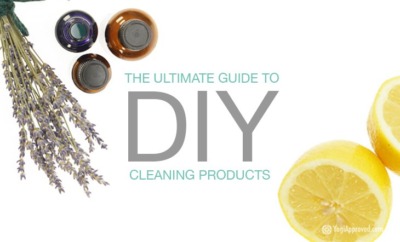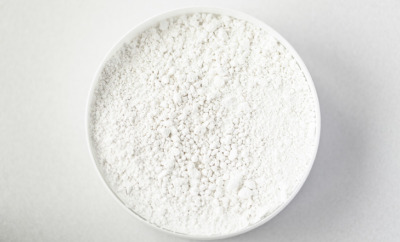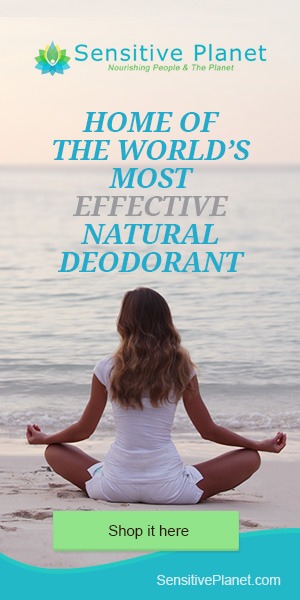6 Reasons You Should Switch to Natural Deodorant NOW!

No one wants to be the “smelly one,” especially in yoga class. However, sweating is a natural bodily function and it should not be unnaturally prevented. While many people turn to antiperspirants to interfere with your body’s natural processes, sweating is actually good for you! When you sweat, you allow your body to expel toxins and regulate its internal temperature.
Sweat is really just a mixture of salt and water and does not have an inherent smell in itself. When you sweat, you may produce an odor, which is actually caused by bacteria that reacts to the moisture. Conventional antiperspirant products contain antibacterial ingredients that kill your body’s natural bacteria before it has an opportunity to produce an odor. While you might think that this is a good thing, unfortunately it’s not good at all!
Modern day deodorants are filled with countless chemicals that can be dangerous to your health. Continued use of these potentially hazardous chemicals can pose negative long-term health effects.
Here are 6 reasons why you should switch to natural deodorant ASAP:
1. Aluminum
Antiperspirant deodorants typically contain aluminum, which inhibits perspiration by clogging your sweat glands and trapping the toxins within your body. The toxins are then accumulated in your lymph nodes, which can cause cell mutation over time.
Aluminum in antiperspirants is a known genotoxin (causes genetic mutations) and an estrogenic (acts as estrogen) that is linked to Alzheimer’s Disease, breast cancer, and prostate cancer.
Danger: Linked to cancer.
Look out for: Aluminum chlorohydrate, aluminum zirconium tetrachlorohydrex gly and any other combination with the word “aluminum” within the ingredient list.
2. Parabens
Breast cancer most often occurs in the upper outer quadrant, near where you apply deodorant in your underarm. In a recent study, 99% of breast cancer samples contained parabens, which is synthetic preservative used in deodorants and other skincare products.
Parabens are also known to disrupt hormone function and lead to reproductive toxicity, immunotoxicity and neurotoxicity. Parabens are also estrogenic and can disrupt hormones in your body, leading to early puberty in children and an increased risk of hormonal cancers.
Danger: Linked to cancer and also a known hormone disruptor.
Look out for: Methyl, ethyl, propyl, isobutyl, benzyl and butyl, and other words ending with paraben, as well as hydroxybenzoic acid and hydroxybenzoate within the ingredient list.
3. Triclosan
Triclosan is a synthetic antibacterial and odor-killing compound that is found in deodorant. This chemical is known to disrupt normal thyroid and hormone function, which can change your genetic material, decrease fertility and increase your risk of birth defects. Triclosan is registered with the EPA as a pesticide and is classified as a probable carcinogen.
Danger: Disrupts thyroid function and linked to cancer.
Look out for: The term “Triclosan” in the ingredient list.
4. Fragrance
The term “fragrance” is a generic word that can mean one of thousands of nasty chemicals that a company doesn’t want to list on an ingredient label. Many of these mystery chemicals are actually phthalates and neurotoxins in disguise!
These chemicals are linked to diabetes, cancer, obesity, fertility issues, and developmental problems. Even if you play it safe and choose unscented deodorant, there may be additional additives used to cover up odors from other chemicals.
Danger: Linked to cancer, diabetes, fertility and developmental issues.
Look out for: The term “Fragrance” in the ingredient list.

5. Propylene Glycol
Propylene glycol is a petroleum-derived chemical that allows skincare products to be more easily absorbed into your skin. It is an inexpensive ingredient that creates a soft, creamier consistency to your deodorant and other skincare products.
In large quantities, propylene glycol can damage your central nervous system, heart and liver. It is potentially toxic and linked to cancer, reproductive issues, developmental problems, neurotoxicity and endocrine complications. It is also a common skin irritant and sensitizer that causes allergic reactions and dermatitis.
Danger: Damages internal organs and linked to cancer.
Look out for: The term “Propylene glycol” in the ingredient list.
6. Phthalates
Phthalates are plasticizers that are added to deodorants and other skincare products to increase flexibility, dissolve other ingredients and create a smooth consistency. They are probable carcinogens and hormone and endocrine disruptors that act as estrogen in your body and increase your risk of cell mutations, asthma, infertility, and cancers (breast, ovarian and prostate). Phthalates also decrease sperm count, and cause damage to lungs, kidneys and liver.
When exposed to phthalates during your childbearing years, there is an increased risk of birth defects and cell mutation.
Danger: Hormone disruptor and cell mutator.
Look Out For: Fragrance, DBP, DEP and derivatives of phthalates listed in the ingredients.
In the past, you may have tried one or many natural deodorants, only to find yourself sweaty, smelly and miserable in no time. Body chemistry can vary greatly from person to person, so when shopping for a natural deodorant, you may have to try out a few brands before you find one that works for you.
Some people may need to choose an option that has high concentrations of baking soda to combat odor, while others may suffice with a dab of coconut oil, tea tree oil or deodorants with a mixture of essential oils and essences, witch hazel, mineral salts, clays and powders.
It’s important to note that if you have been using conventional deodorants and antiperspirants for years, there will be an adjustment period.
You should start cold turkey (or apply an essential oil or non-baking soda formula), but choose your time wisely, such as a long weekend or vacation when you won’t run the risk of offending anyone with your funk. You will inevitably smell as your body expels the toxins that have been pent up beneath your skin, and that’s ok! This simply means you are taking the necessary steps to get back to being all-natural.
After three days, you can transition to your natural deodorant of choice. If you use a deodorant with baking soda, there may be some irritation, so use it sparingly at first while your body has time to adjust. If the irritation persists, cease use and try another formula until you find your right fit.
Try out a few products and a few brands and give it a few days each to see how your body reacts, and then stick with the product that works best for you. You will be happy that you did!


This Month's Letter
From the Editor
Monthly motivation and food for
thought from our founder.
































Comments